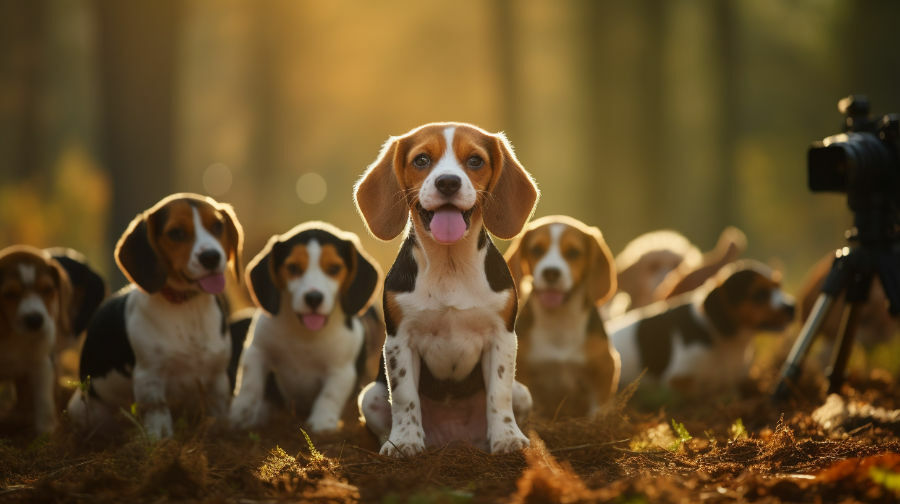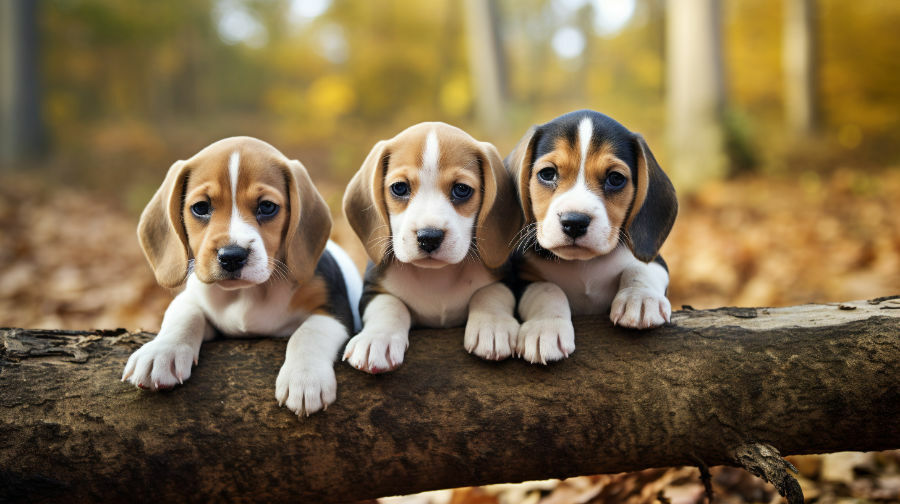Physical Address
304 North Cardinal St.
Dorchester Center, MA 02124

Welcome to our article on Beagle behavior and their ability to bond with other Beagles. Beagles are a popular dog breed known for their friendly nature and playfulness, making them great companions for families and individuals alike. However, it is important to understand their temperament and upbringing, as they can affect their ability to interact with other Beagles.
Beagles were originally bred for hunting, which may impact their interactions with other dogs. While they tend to be friendly and sociable, some Beagles may display aggression towards other Beagles, especially if they feel threatened or if they were not properly socialized from a young age.
Beagles are a popular dog breed known for their affectionate and friendly nature. As a companion dog, they are a great addition to any family looking for a furry friend to share their home with. However, Beagles are also high energy dogs with a strong sense of smell, owing to their history as hunting dogs. For this reason, they require mental stimulation and plenty of exercise to stay healthy and happy.
When it comes to building strong bonds with other Beagles, socialization is key. Beagles are social animals and thrive in the company of others, especially those of their own breed. Proper socialization can help Beagles learn how to interact with other dogs, reducing the risk of aggression and ensuring that they make great companions for their owners.
It is also important to note that Beagles are not generally aggressive towards other dogs. However, like any dog breed, their behavior towards other Beagles can be influenced by their temperament and upbringing. If a Beagle has had negative experiences with other dogs or has not been socialized adequately, they may show signs of aggression or fear towards other Beagles.
Proper socialization can help Beagles become well-adjusted dogs that are comfortable around other Beagles and animals. It can also help reduce their risk of developing separation anxiety, which is a common issue among Beagles and other dog breeds.
Beagles that are well-socialized are more likely to be confident and outgoing, making them great companions for families with children or other pets. Additionally, a Beagle that is well-socialized is more likely to be able to handle different social situations, such as visits to the vet or groomer.
The best way to socialize your Beagle is to start at a young age. When introducing your Beagle puppy to other dogs, it is important to choose neutral territory and gradually introduce the dogs to each other. This can help prevent aggressive or fearful behavior towards other dogs.
If you are considering adding a second Beagle to your family, it is best to get a puppy of a similar age, as they are more likely to get along and form a strong bond. However, it is important to remember that the temperament of each individual dog can vary, so it is important to monitor their interactions and intervene if necessary.
It is also important to provide your Beagle with plenty of exercise and mental stimulation. Beagles have a lot of energy and require daily exercise to stay healthy and happy. This can include walks, runs, or playing fetch in a fenced yard.
Beagles are great companions and are known for their friendly nature. With proper socialization, they can develop strong bonds with other Beagles and animals, making them a great addition to any family. By choosing neutral territory and gradually introducing your Beagle to other dogs, you can help ensure that they get along and form strong bonds with other animals.

Introducing Beagles to other Beagles can be a fun and rewarding experience for both dogs and their owners. However, it’s important to take the necessary steps to ensure a smooth introduction and foster a positive relationship between the dogs.
Here are some tips for successfully introducing Beagles to other Beagles:
It’s important to consider each Beagle’s temperament when introducing them to other dogs. Beagles are generally friendly and social creatures, but some may feel threatened or become aggressive towards other dogs. If your Beagle shows signs of aggression or discomfort around other dogs, it’s important to address the issue with a professional trainer.
By following these tips and taking the necessary precautions, you can help your Beagle build strong bonds with other Beagles and enjoy a happy, social life.
While Beagles are known for their friendly nature, their compatibility with other dog breeds can vary. When considering adding a Beagle to your family, it’s important to take into account the temperament and energy level of the breed you plan to pair them with. Here are some popular dog breeds and how they may fare with a Beagle companion:
| Basset Hounds | These two breeds get along famously and make a great pair due to their shared history as hunting dogs. Their laid-back demeanor and love of napping makes them an ideal match. |
|---|---|
| Bull Terriers | While Bull Terriers can be stubborn and assertive, their playful nature and high energy level can make them a good match for Beagles if introduced properly. Supervision is key to ensure a harmonious relationship between these two breeds. |
| Golden Retrievers | These two breeds can make great companions and are known for their love of play and loyalty. However, Golden Retrievers tend to have higher energy levels and may require more exercise than a Beagle, so it’s important to ensure both dogs receive adequate physical activity and mental stimulation. |
| Cocker Spaniels | Cocker Spaniels are known for their gentle and affectionate disposition, which can make them a good match for Beagles. However, they may be prone to jealousy if they feel their owner’s attention is being taken away from them. |
| German Shepherds | German Shepherds tend to be more reserved around unfamiliar dogs, which can make introducing them to a Beagle a bit more challenging. However, with proper socialization and supervised interaction, these two breeds can form a strong bond. |
| Shih Tzus | Shih Tzus are generally friendly and affectionate, which can make them a good match for Beagles. However, they may be intimidated by a Beagle’s high energy level and boisterous play style. |
| Border Collies | Border Collies require a lot of physical activity and mental stimulation, which can make them a good match for Beagles. However, their herding instincts may cause them to try to control a Beagle’s movements, which can lead to tension between the two breeds. |
| Jack Russells | Both breeds have high energy levels and are known for their love of play. However, Jack Russells can be assertive and dominant, so it’s important to supervise their interactions and ensure both dogs have their own space to retreat to if needed. |
| Australian Shepherds | Australian Shepherds are highly intelligent and energetic, which can make them a good match for Beagles. However, their high energy levels may require more exercise and mental stimulation than a Beagle can provide, so it’s important to ensure both breeds receive adequate physical activity and mental stimulation. |
When introducing a Beagle to another dog breed, it’s important to take things slow and choose neutral territory. With patience, proper socialization, and supervision, a Beagle can form strong bonds with a variety of dog breeds.
Here are some commonly asked questions and concerns regarding Beagles getting along with other dogs:
While Beagles were originally bred for hunting small game, including rabbits, their natural instincts do not necessarily make them aggressive towards other dogs. However, it is important to remember that each dog is an individual and may have their own unique personality and behavior towards other dogs. Early socialization and training can help prevent any potential aggression towards other dogs.
Beagles are not typically considered to be effective guard dogs as they are generally friendly and not very territorial. They may bark to alert their owners to the presence of strangers, but they are not typically trained to actively protect their homes.
Beagles are known for their friendly and sociable nature, making them a great choice for families with children. However, it is important to remember that they are a high-energy breed and require plenty of exercise and mental stimulation to prevent destructive behavior.
If your Beagle feels threatened or displays any signs of aggression towards another dog, it is best to remove them from the situation immediately. Consult with a professional dog trainer or behaviorist to address any underlying issues and work on training and socialization techniques to prevent future conflicts.